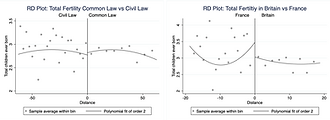
I am a Post-Doctoral Researcher at the Faculty of Economics and Business of the University of Groningen in the Netherlands. My research focuses on applied microeconomics, impact evaluation, and gender, examining how policies and cultural contexts shape women's empowerment and demographic outcomes in developing countries.
My work spans fertility dynamics, conflict, and agricultural productivity across South Asia and sub-Saharan Africa, employing quasi-experimental methods to identify causal relationships.
I hold a Ph.D. in Development Economics from the Geneva Graduate Institute. My research has been supported by grants from the International Growth Centre and the Center for Global Development. Prior to academia, I contributed to policy research at J-PAL, the World Bank, and WIPO.
News: I have been awarded a research grant from the ReCIPE program, managed by the CEPR - Centre for Economic Policy Research and funded by the Foreign, Commonwealth and Development Office.The grant will support my new project studying Land Reforms, Women’s Empowerment and Conflict in Rwanda.
Research
Published Papers

THE SEEN AND THE UNSEEN: IMPACT OF A CONDITIONAL CASH TRANSFER PROGRAM ON PRENATAL SEX SELECTION (with Sayli Javadekar),Journal of Population Economics (2025)

RELIGIOUSLY-INSPIRED BABY BOOM: EVIDENCE FROM GEORGIA (with Seung-Hun Chung, Neha Deopa, and Lyman Stone), Journal of Population Economics (2025)

VIOLENT CONFLICTS AND LEARNING OUTCOMES: EVIDENCE FROM SUB-SAHARAN AFRICA (with Mhamed Ben Salah), World Development (2025)
Working Papers

LATE ADOPTION AND COLLECTIVE ACTION: SOCIAL MEDIA ADOPTION AND BLACK LIVES MATTER (with Annalí Casanueva Artís, Vladimir Avetian, and Sulin Sardoschau)(Submitted)

EMPOWERING ADOPTION: EXPERIMENTAL EVIDENCE ON NUTRITIONAL SEEDS UPTAKE BY ETHIOPIAN WOMEN FARMERS (with Temesgen K. Belissa, Robert Lensink, and Abdeta G. Wakoya)

IMPERIAL FAULTLINES: COLONIAL LEGACY AND FERTILITY IN SUB-SAHARAN AFRICA
ROLE OF FINANCIAL DEVELOPMENT FOR FINANCING ENVIRONMENTAL TECHNOLOGIES: CROSS COUNTRY EVIDENCE
Ongoing Projects
THE EFFECT OF BOKO HARAM INSURGENCY ON CHILD MARRIAGE (with Simeon Lauterbach)
IMPROVING FOOD AND NUTRITION SECURITY BY ENHANCING WOMEN'S EMPOWERMENT IN BANGLADESH
Grants
Building Peace: The Causal Impact of Post-Genocide Land Reform on Women’s Empowerment and Conflict in Rwanda
This grant for GBP 18000 is under the ReCIPE program, managed by the CEPR - Centre for Economic Policy Research and funded by the Foreign, Commonwealth and Development Office.
THE SHORT-TERM EFFECTS OF THE COVID-19 LOCKDOWN ON RURAL COMMUNITIES IN INDIA, (with Ashwini Deshpande, Joshua Merfeld, and Lore Vandewalle)
International Growth Center (IGC) COVID Short Project Grant for 20,000 GBP. This grant was used to collect data from SHG members, local government officials, and health workers to better understand policy implementation and coordination issues during the pandemic in 2020.
Contribution to Policy Research
Contributions to ITC's SME Competitiveness Outlook
SME COMPETITIVENESS OUTLOOK 2023: SMALL BUSINESS IN FRAGILITY
Contributions to The Global Innovation Index co-produced by Cornell University, INSEAD, and WIPO
GLOBAL INNOVATION INDEX 2018: ENERGIZING THE WORLD WITH INNOVATION
GLOBAL INNOVATION INDEX 2017: INNOVATION FEEDING THE WORLD
GLOBAL INNOVATION INDEX 2016: WINNING WITH GLOBAL INNOVATION
Contributions to World Bank policy reports
ADDRESSING INEQUALITY IN SOUTH ASIA
TEACHING
I teach the following courses for Maters students at Faculty of Economics and Business at the University of Groningen
Inclusive Finance
International Finance and Development
In July 2025, I taught two lectures at a Summer School in Ghana organised by CORE-IPD
The first lecture was on Gender Inequality in Sub-Saharan Africa
The second on Regression Discontinuity Design.
Teaching material for RDD lecture can be found here.
I supervise following P.hD. students
Afroza Shimu (2022-2026)
Abdeta Gutu Wakoya (2022-2026)
Alexandra Gies (2023-2027)